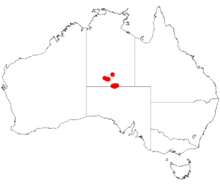| Acacia latzii | |
|---|---|
| Conservation status | |
 Vulnerable (TPWCA) | |
 Vulnerable (EPBC Act) | |
| Scientific classification | |
| Kingdom: | Plantae |
| Clade: | Tracheophytes |
| Clade: | Angiosperms |
| Clade: | Eudicots |
| Clade: | Rosids |
| Order: | Fabales |
| Family: | Fabaceae |
| Subfamily: | Caesalpinioideae |
| Clade: | Mimosoid clade |
| Genus: | Acacia |
| Species: | A. latzii |
| Binomial name | |
| Acacia latzii Maslin | |

| |
| Occurrence data from AVH | |
Acacia latzii, also known as Latz's wattle and Tjilpi wattle, is a shrubby tree of the genus Acacia (in the family Fabaceae and the subgenus Plurinerves). It is native to the Finke bioregion (in the south of the Northern Territory and the north of South Australia).
Description
A. latzii is a shrub or tree which grows to a height of 3 to 7 m (9.8 to 23.0 ft). The branchlets may be smooth or have a sparse covering of minute flat lying hairs. The phyllodes (5 to 10 cm (2.0 to 3.9 in) long by 2 to 4 mm (0.079 to 0.157 in) wide) are narrowly linear and generally with a shallow incurving. They are leathery and a khaki to greyish green and like the branchlets may be smooth or have a sparse covering of fine hairs. They have many closely parallel veins. The inflorescences are two to five headed racemes with the raceme axes being 1.5 to 5 mm (0.059 to 0.197 in) long. The flower stalks are 5–9 mm long and have a covering of fine hairs. The heads are globular (4 mm (0.16 in) in diameter) with 13 to 18 flowers. The flowers are 5-merous and the sepals are free. The smooth, leathery pods are up to 15 cm (5.9 in) long. The dull, brown-black, oblong seeds are 5.5 mm (0.22 in) in length. It flowers from April to August and fruits from February to November.
Habitat
It is found growing in skeletal alkaline soil in gullies and on minor hill slopes.
Conservation status
It has been declared "vulnerable" under both Commonwealth and Northern Territory legislation. It is threatened by
- increased fire exposure associated with Buffel Grass invasion;
- seedling loss from browsing and trampling by cattle and feral herbivores;
- vulnerable to decline due its small population and its fragmented distribution;
- altered rainfall patterns (due to climate change) which may affect adult survivorship and decrease the rare recruitment events.
Taxonomy
It was first described by Bruce Maslin in 1980 and named A. latzii to honour Peter Latz whose "fine" collections were the basis of Maslin's descriptions. An isotype, CANB 267113.1, was collected by Latz in the Beddome Range, New Crown Station, on 21 April 1977
References
- ^ "NT Flora factsheet: Acacia latzii". eflora.nt.gov.au. Retrieved 23 November 2019.
- ^ "Acacia latzii". Australian Plant Name Index, IBIS database. Centre for Plant Biodiversity Research, Australian Government.
- ^ Maslin, B.R. (1980). "Acacia (Leguminosae-Mimosoideae): A contribution to the flora of central Australia". Journal of the Adelaide Botanic Gardens. 2 (4): 313, fig. 5,8 (map). JSTOR 23872363.
- ^ Cowan, R.S.; Maslin, B.R. (2019). "Acacia latzii. In: Flora of Australia". profiles.ala.org.au. Australian Biological Resources Study, Department of the Environment and Energy, Canberra. Archived from the original on 15 April 2021. Retrieved 23 November 2019.
- Stirton, C.; Maslin, B. (1998). "Generic and infrageneric classification in Acacia". Bulletin of the Mimosoidae Working Group. 20.
- ^ Nano, C.; Kerrigan, R.; Albrecht, D.; Pavey, C. (2012). "Threatened Species of the Northern Territory: Acacia latzii Maslin" (PDF).
- Department of the Environment. "Acacia latzii — Latz's Wattle". www.environment.gov.au. Commonwealth of Australia. Retrieved 14 December 2019.
- "Occurrence record: CANB 267113.1".